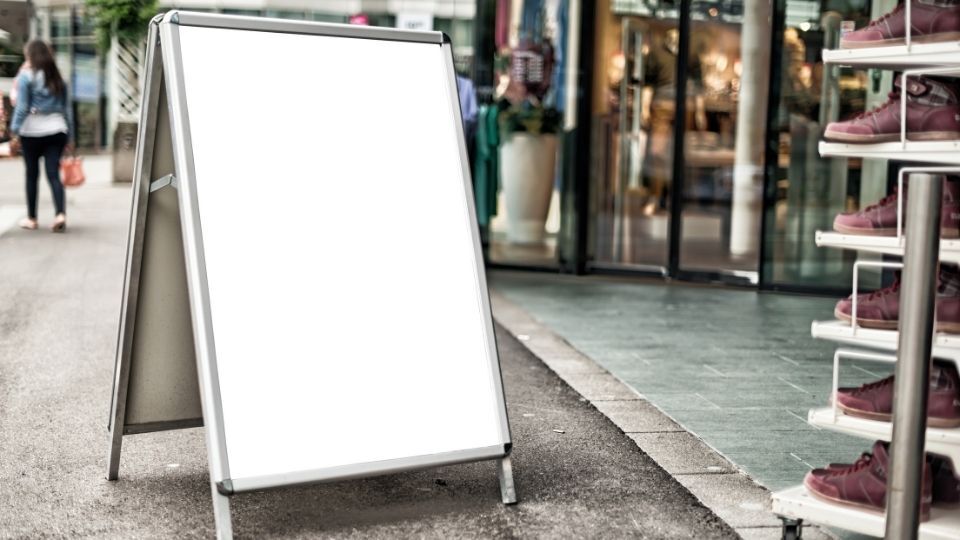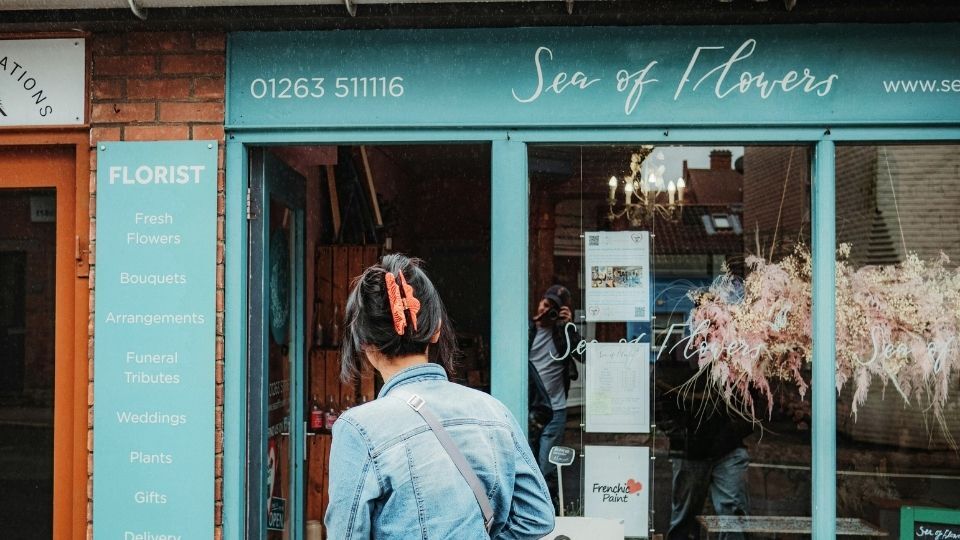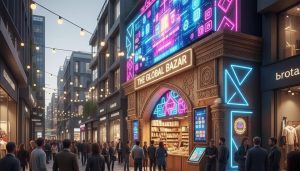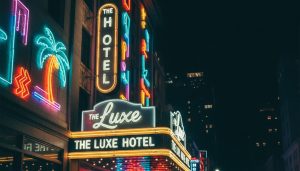Your shop front is more than an entryway, it’s your handshake to the world. Before a potential customer even steps inside, they form an impression based on how your storefront looks. Well-designed shop front signs do more than display a name; they create intrigue, communicate brand values, and pull people in from the street.
In today’s competitive retail landscape, shop front signs designs can be the defining factor that sets you apart. Whether you’re on a bustling high street or tucked away in a neighbourhood lane, your signage has to work hard – catching eyes, sparking curiosity, and staying memorable.
This article explores a range of innovative shop front signs designs ideas, blending modern creativity with proven strategies to transform your storefront. From bold typography to lighting techniques, from traditional craft to digital integration, these concepts will inspire you to reimagine how your business greets the world.
The Importance of Shop Front Signs Designs in Retail Success
The average shopper makes split-second decisions about whether to enter a store. In fact, research shows that many people decide within three to five seconds if a shop looks appealing enough to explore further. That crucial moment is where your shop front signs designs come into play.
Well-thought-out signage goes beyond decoration. It serves four essential purposes:
- Attract Attention
A striking shop sign pulls eyes from the pavement, standing out among competing storefronts. In crowded high streets or shopping districts, unique shop front signs designs help you avoid blending into the background. - Communicate Identity
Your signage tells a story about your brand – whether you are modern and sleek, traditional and trustworthy, quirky and creative, or luxurious and exclusive. A customer often forms this impression without consciously realising it. - Enhance Visibility
Visibility isn’t only about size. Placement, lighting, and contrast matter just as much. Effective shop front signs designs ensure your store is easy to locate day or night, regardless of surrounding distractions. - Encourage Foot Traffic
A professional, inviting shop sign makes your store approachable. When people feel drawn in, they’re more likely to step through your doors – turning passers-by into potential customers.
Modern Trends in Shop Front Signs Designs
Retail environments evolve quickly, and so do customer expectations. Outdated signage can make your shop look neglected, while fresh, innovative shop front signs designs can instantly signal relevance and professionalism. Understanding modern trends helps you align your storefront with what today’s shoppers find appealing.
1. Minimalist Aesthetics
Clean, uncluttered designs are currently leading the way. A focus on bold typography, neutral backgrounds, and strategic use of colour gives your signage a sophisticated, modern edge. Minimalism works especially well for high-end brands, boutiques, and professional services.
2. 3D Lettering and Dimensional Signs
Flat signs no longer carry the same impact. 3D lettering adds depth and shadow, creating a more striking look. Materials like brushed metal, acrylic, or timber bring texture and tactility to the sign, ensuring it stands out even in a busy environment.
3. Sustainable and Eco-Friendly Materials
Consumers today are increasingly eco-conscious, and they notice when brands reflect these values. Using reclaimed wood, recycled metals, or energy-efficient LED lighting in your shop front signs designs not only reduces environmental impact but also appeals to ethically minded customers.
4. Digital and Interactive Displays
Digital signage is revolutionising retail spaces. LED screens, scrolling messages, or interactive touch displays allow for dynamic content that can be updated instantly. This trend is particularly useful for businesses that change promotions regularly, such as cafés, fashion retailers, or event spaces.
5. Retro Revival
While modern is popular, nostalgia sells. Retro-inspired signs, such as hand-painted lettering or neon tubing, create a sense of charm and individuality. For some businesses, especially in hospitality or lifestyle retail, vintage-inspired signage helps establish character and authenticity.
6. Bold Colour Contrast
Strategic use of colour remains a powerful design tool. High-contrast combinations not only increase readability from a distance but also draw attention in crowded areas. Colours aligned with brand identity help reinforce recognition and consistency.
Types of Shop Front Signs Designs to Consider
Choosing the right type of signage is just as important as the design itself. Each format serves a different purpose, and when used strategically, they can work together to create a cohesive, visually powerful storefront. Here are the most common and effective shop front signs designs to explore:
1. Fascia Signs
The fascia board above your entrance is often the most dominant element of your storefront. It’s where your brand name and logo usually sit, making it the centrepiece of your shop front signs designs. Options range from sleek acrylic panels to traditional hand-painted timber, depending on the character you want to convey.
2. Projecting and Hanging Signs
Projecting signs (also known as blade or hanging signs) extend outward from your shopfront, ensuring visibility for pedestrians approaching from either side. They are especially effective in narrow streets or busy high streets where people don’t always view shops head-on.
3. Illuminated Signs
Illuminated signs work 24/7, ensuring your brand is visible even after dark. LED backlighting, halo-lit lettering, and neon tubes are popular techniques that add both function and flair. Effective illumination can turn ordinary shop front signs designs into standout features.
4. Window Graphics and Vinyls
Glass surfaces are often underutilised. Window vinyls or decals can promote seasonal offers, highlight products, or simply add branding detail. They’re versatile, cost-effective, and easy to update as campaigns change.
5. Pavement Signs and A-Boards
Technically not part of the physical façade, but these portable signs extend your reach onto the pavement, catching the attention of passers-by who might otherwise miss your storefront. Chalkboard A-boards are especially effective for cafés and restaurants, adding a personal touch.
6. Architectural Signage
Sometimes, signage is integrated directly into the architecture of the building itself. This might include engraved stonework, embossed metalwork, or carved wooden lettering. These designs are timeless, durable, and particularly effective for businesses wanting to project heritage and permanence.
7. Digital Signage
For businesses that thrive on dynamic content—such as retail fashion, hospitality, or entertainment—digital shop signs offer endless flexibility. Content can be updated instantly to showcase promotions, events, or time-sensitive messages.
Creative Design Ideas for Unique Shop Front Signs
While functionality and visibility are non-negotiable, creativity is what makes a shop sign unforgettable. Businesses that invest in distinctive, imaginative shop front signs designs often enjoy greater recognition and customer engagement. Here are some inspiring approaches:
1. Typography as Art
Letters don’t just spell out your name—they can also serve as visual statements. Oversized serif fonts suggest heritage and authority, while sleek sans-serif designs feel modern and approachable. Hand-drawn lettering adds personality and craft. Treating typography as an artistic element ensures your signage doesn’t look generic.
2. Layered and Mixed Materials
Combining materials such as wood, acrylic, glass, and metal creates depth and contrast. For example, a wooden fascia with raised metallic lettering creates a premium look, while glass panels etched with frosted designs convey elegance. This layered approach elevates shop front signs designs beyond flat, two-dimensional visuals.
3. Statement Lighting
Lighting isn’t only about visibility; it’s also about mood. Halo lighting creates a soft, glowing edge around letters, while exposed filament bulbs can evoke a rustic, vintage feel. Neon remains iconic for businesses wanting vibrancy and nightlife appeal.
4. Artistic Illustrations and Murals
Hand-painted graphics or murals can transform an ordinary shopfront into a landmark. Whether it’s a bakery showcasing illustrated loaves and pastries or a record shop with painted vinyl art, these creative details help your storefront become instantly recognisable.
5. Seasonal and Changeable Features
Incorporating design elements that change with the season keeps your storefront looking fresh. Interchangeable panels, window decals, or magnetic boards allow you to update messages and visuals without replacing the core sign. Customers notice and appreciate the variety.
6. Playful or Interactive Elements
Some of the most memorable shop front signs designs invite interaction. Think chalkboards that encourage customers to leave messages, or cleverly designed signs with 3D features that double as photo opportunities. This approach generates both engagement and free publicity through social sharing.
7. Heritage and Local Identity
For businesses rooted in their community, drawing on local culture, history, or architectural styles can strengthen identity. A pub might echo historical lettering styles, while a boutique could integrate patterns inspired by local crafts. Such touches connect your brand to its surroundings.
How to Choose the Right Shop Front Signs Designs for Your Business

Every business has different needs, audiences, and environments, so there’s no single “best” sign. The right choice depends on aligning design with strategy. To avoid wasted investment and ensure your signage works as hard as possible, consider these key factors:
1. Understand Your Audience
Who are you trying to attract? A sleek, minimal design may appeal to professionals in finance or law, while a colourful, playful design could resonate better with families or younger shoppers. Tailor your shop front signs designs to the expectations of your target audience.
2. Assess Your Location
Your surroundings heavily influence what works. In a crowded high street, you may need bold, illuminated signage to cut through visual noise. In a quieter suburban area, a softer, more personal design may be more effective. Always consider the context in which your storefront signs sit.
3. Prioritise Visibility and Legibility
No matter how artistic your design is, if it can’t be read quickly and clearly, it fails. Contrast between background and text, font size, and lighting all affect legibility. Test your design from different distances and angles before committing.
4. Align with Brand Identity
Consistency is crucial for building trust. The colours, fonts, and materials used in your signage should reflect your wider branding—online, in print, and across packaging. A mismatch between your shop front signs designs and your brand elsewhere confuses customers and undermines credibility.
5. Consider Longevity and Maintenance
Some materials weather better than others. Painted timber may require regular upkeep, while acrylic or metal can last longer with less maintenance. Think about durability, especially if your business relies on year-round street visibility.
6. Balance Creativity with Professionalism
Innovation is important, but professionalism should never be compromised. A quirky sign may attract attention, but if it looks cheap or poorly made, it could damage perceptions of quality. Always strike a balance between imaginative and polished execution.
7. Budget Wisely
Your budget will naturally guide your options, but don’t treat signage as an expense—it’s an investment. A well-designed sign can last years and attract thousands of customers. Consider both initial cost and long-term return when deciding how much to spend.
The Role of Materials and Craftsmanship in Shop Front Signs Designs
The substance of a sign is just as important as its style. The materials you choose and the quality of the workmanship directly affect durability, appearance, and customer perception. Poorly made signage not only weathers badly but can also reflect poorly on your business, signalling neglect or lack of professionalism. By contrast, high-quality materials and skilled craftsmanship elevate your brand image and ensure your shopfront continues to perform year after year.
1. Timber
Wood remains a classic choice for traditional and heritage-inspired shop front signs designs. Its natural warmth conveys authenticity, craft, and trustworthiness. Hand-painted or carved wooden signs are particularly popular with pubs, cafés, and independent boutiques. However, timber requires regular maintenance to protect it from weathering.
2. Metal
Aluminium, stainless steel, brass, and copper bring a strong, durable, and often premium feel. Brushed or polished finishes can create either a sleek modern look or a more industrial edge. Metal signs are highly weather-resistant and, when paired with precision craftsmanship, can look sharp and contemporary.
3. Acrylic and Plastics
Lightweight, versatile, and cost-effective, acrylic is widely used in modern shop front signs designs. It allows for vibrant colour printing, 3D lettering, and illumination integration. High-quality acrylic signage is particularly popular for retail chains, beauty salons, and service providers looking for a clean, professional aesthetic.
4. Glass
Etched, frosted, or painted glass creates an elegant, high-end look. Often used in combination with metal fixtures or backlighting, glass signage communicates sophistication and exclusivity. It’s well-suited to businesses like fashion retailers, jewellers, or upmarket salons.
5. Stone and Concrete
For a bold, timeless presence, stone or concrete can be integrated into the building façade itself. Engraved stonework suggests permanence and heritage, often found in historic districts or prestigious institutions. Though expensive, stone signage makes a strong statement of credibility and legacy.
6. Neon and LED Lighting
Lighting technology has revolutionised signage materials. Neon tubes remain iconic, particularly for nightlife venues, while LED lighting offers energy efficiency and flexibility in colours and effects. Quality craftsmanship is essential here, as poorly installed lighting quickly looks unprofessional.
7. Composite and Sustainable Options
Eco-conscious businesses increasingly explore sustainable materials—such as reclaimed timber, recycled metals, or biodegradable plastics. Composite boards (like Dibond) provide a balance between durability and lightweight design. Choosing sustainable materials in shop front signs designs not only reduces environmental impact but also enhances brand reputation among environmentally aware customers.
Craftsmanship Matters
Even the best materials can underperform if the build quality is poor. Crisp lettering, seamless joins, durable finishes, and weather-resistant coatings all reflect the skill of the craftsman. Customers notice these details subconsciously: a well-made sign suggests care, professionalism, and reliability—qualities they will expect from your products or services.
In short, material and craftsmanship choices aren’t merely practical—they are part of the message your storefront communicates. Investing in quality signals to customers that you value excellence in every part of your business.
The Psychology of Colour and Typography in Shop Front Signs Designs
Signage is not just visual—it’s psychological. Every colour, font, and stylistic decision affects how people feel about your brand before they even walk through the door. By carefully selecting colour schemes and typography, you can subtly guide perceptions, trigger emotions, and influence behaviour.
1. The Psychology of Colour
Colour is one of the first things people notice about shop front signs designs, and each shade carries meaning:
- Red – Bold, urgent, and energetic. Ideal for sales-driven businesses like fast food outlets or clearance retailers.
- Blue – Trustworthy, calm, and professional. Often used in finance, healthcare, and corporate settings.
- Green – Natural, fresh, and eco-friendly. Common for health food shops, wellness centres, and eco-conscious brands.
- Black – Elegant, sophisticated, and authoritative. Popular in luxury retail and high-end services.
- Yellow – Cheerful, optimistic, and attention-grabbing. Effective for cafés, children’s stores, and casual dining.
- White – Clean, minimal, and modern. Used in contemporary brands aiming for simplicity and clarity.
The key is balance. Too much bold colour can overwhelm, while too much neutrality risks blending in. Effective shop front signs designs often use contrast—such as dark lettering on a light background—for readability and visual punch.
2. Typography Choices
Fonts play a powerful role in shaping identity. Just as with colour, different typography styles communicate distinct brand values:
- Serif Fonts (e.g., Times-style) – Traditional, formal, and authoritative. Excellent for heritage brands, bookshops, or legal firms.
- Sans Serif Fonts (e.g., Helvetica-style) – Clean, modern, and approachable. Widely used in tech, fashion, and contemporary retail.
- Script Fonts – Elegant, artistic, and personal. Common in boutique shops, cafés, and creative businesses.
- Custom Hand-Drawn Lettering – Unique, quirky, and authentic. Perfect for small independents that want to emphasise individuality.
Typography should always be legible at a glance. Overly elaborate fonts may look stylish up close but lose impact at a distance. Testing your design in real-world conditions ensures it performs well visually and practically.
3. The Colour–Font Combination
The real magic happens when colour and typography work together. For example:
- A black serif font on cream suggests heritage and class.
- A bold red sans serif font on white shouts urgency and energy.
- A handwritten font in soft pastels conveys creativity and friendliness.
This harmony ensures your shop front signs designs communicate not just your name, but your personality.
4. Emotional Influence
Ultimately, colour and typography are tools for emotional influence. They make people feel something—whether it’s excitement, trust, curiosity, or comfort. Businesses that invest in these details often see stronger customer connections and higher foot traffic.
In short, great signage isn’t just about being seen—it’s about being felt.
Frequently Asked Questions
1. Why are shop front signs designs so important for a business?
Shop front signs designs are crucial because they act as the first impression of your business. A well-designed sign attracts attention, communicates your brand identity, and encourages customers to step inside. Without effective signage, even the best products or services may be overlooked.
2. What makes shop front signs designs effective?
Effective shop front signs designs balance visibility, creativity, and professionalism. They should be easy to read, aligned with your brand identity, and designed to stand out in your location. Good signage combines colour psychology, strong typography, and quality craftsmanship.
3. How can shop front signs designs help increase foot traffic?
By making your storefront more visible and inviting, shop front signs designs naturally draw in potential customers. Signs that are clear, well-lit, and creative can turn casual passers-by into paying visitors, helping boost revenue.
4. What types of shop front signs designs are available?
There are many types, including fascia signs, projecting signs, illuminated signs, window graphics, A-boards, and digital signage. Each type of shop front signs designs serves a different purpose, and the most effective storefronts often use a combination for maximum impact.
5. Which materials are best for shop front signs designs?
The best materials depend on your brand and budget. Wood conveys tradition, metal looks modern and durable, acrylic is versatile and cost-effective, while glass and stone communicate premium quality. Sustainable materials are also gaining popularity in innovative shop front signs designs.
6. Are illuminated shop front signs designs worth the investment?
Yes. Illuminated shop front signs designs ensure your business is visible day and night, making them highly effective in busy retail districts or hospitality venues. LED and neon options are especially popular for combining style with practicality.
7. How do colours affect shop front signs designs?
Colours in shop front signs designs influence customer perception. For example, red creates urgency, blue conveys trust, green suggests freshness, and black signals luxury. The right colour scheme can strengthen your brand message and attract the right audience.
8. Can shop front signs designs be sustainable?
Absolutely. Many businesses now choose eco-friendly shop front signs designs made from reclaimed wood, recycled metals, biodegradable plastics, or energy-efficient LED lighting. These options reduce environmental impact and appeal to eco-conscious customers.
9. How often should shop front signs designs be updated?
It depends on your industry and branding strategy. Some businesses refresh their signage every 5–7 years to keep up with trends, while others may update more frequently with seasonal or promotional graphics. Outdated or weathered shop front signs designs should always be replaced promptly.
10. How much do shop front signs designs cost?
Costs vary depending on size, materials, illumination, and custom features. While prices range widely, it’s important to view shop front signs designs as a long-term investment that will deliver returns by attracting more customers.
11. Do shop front signs designs work for online-driven businesses?
Yes. Even if most sales come from online, physical shop front signs designs establish brand presence and legitimacy. A strong storefront creates trust and credibility, which supports both offline and online success.
12. How do I choose the right designer or supplier for shop front signs designs?
Look for providers with a proven portfolio, knowledge of materials, and experience in both design and installation. A professional supplier will understand how to balance aesthetics with functionality to deliver high-performing shop front signs designs
Turn your storefront into a customer magnet—explore creative sign ideas today
.

















